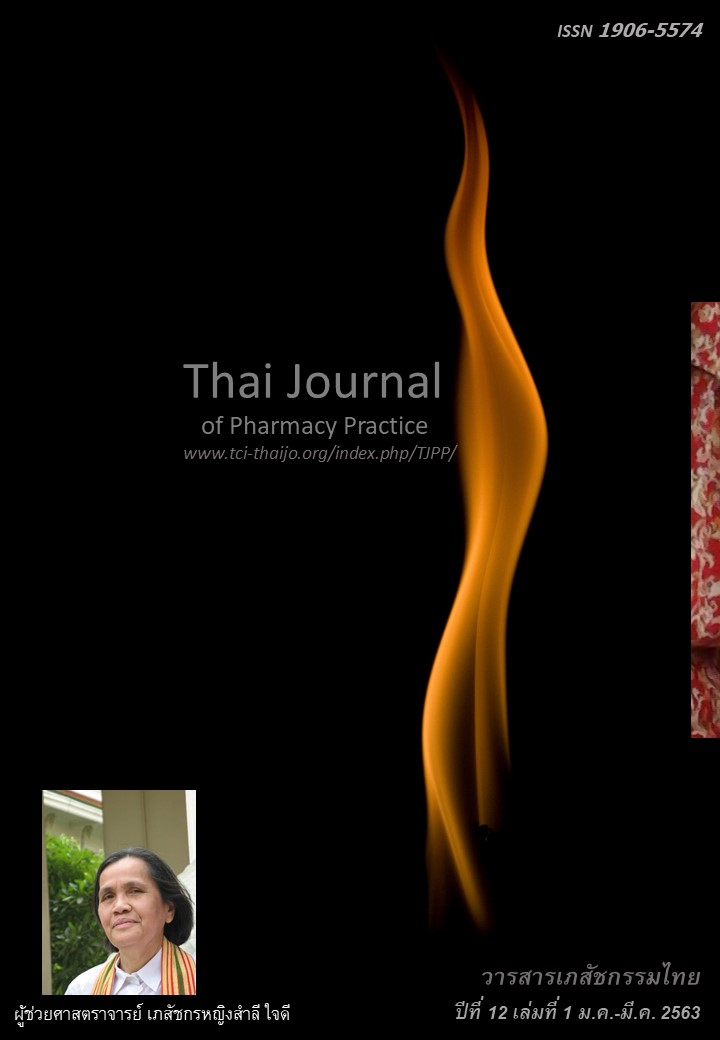การพัฒนารูปแบบการดูแลผู้ป่วยโรคไตเรื้อรังโดยสหวิชาชีพ ณ โรงพยาบาลนางรอง
Main Article Content
บทคัดย่อ
วัตถุประสงค์: เพื่อพัฒนารูปแบบการดูแลผู้ป่วยโรคไตเรื้อรังระยะที่ 3-4 โดยทีมสหวิชาชีพ ที่คลินิกโรคไตเรื้อรัง แผนกผู้ป่วยนอก วิธีการ: การศึกษานี้เป็นการวิจัยเชิงปฏิบัติการ โดยใช้การสนทนากลุ่มในทีมสหวิชาชีพ จำนวน 9 คน เพื่อพัฒนารูปแบบการดูแลผู้ป่วยโรคไตเรื้อรังระยะที่ 3-4 การศึกษานำรูปแบบที่ได้ไปปฏิบัติที่คลินิกโรคไตในผู้ป่วย 29 ราย การศึกษาประเมินผลในด้านความรู้ พฤติกรรมการปฏิบัติตัว ความพึงพอใจ และผลลัพธ์ทางคลินิกโดยเปรียบเทียบก่อนและหลังการปรับรูปแบบการดูแลผู้ป่วย โดยใช้ระยะเวลาในการศึกษา 7 เดือน ผลการวิจัย: ปัญหาการใช้ยาที่พบส่วนใหญ่คือ การเก็บรักษายาไม่ถูกต้อง (ร้อยละ 17.65) การรับประทานยาไม่ถูกต้อง (ร้อยละ 14.71) การแกะเม็ดยาเนื่องจากกล้ามเนื้อมืออ่อนแรง (ร้อยละ 14.71) และผู้ป่วยโรคไตเรื้อรังยังขาดความรู้ในเรื่องโรค อาหาร ยา และสมุนไพร หลังใช้รูปแบบการดูแลผู้ป่วยโดยการมีส่วนร่วมของสหวิชาชีพ ความรู้เรื่องโรคของผู้ป่วยเพิ่มขึ้นอย่างมีนัยสำคัญทางสถิติ (P<0.001) จาก 9.83±2.14 เป็น 12.52 ± 1.47 คะแนน พฤติกรรมในการปฏิบัติตัวเพิ่มขึ้นอย่างมีนัยสำคัญทางสถิติ (P=0.002) จาก 46.52 ± 4.42 เป็น 49.41 ± 4.98 คะแนน ความพึงพอใจต่อการรับบริการของผู้ป่วยก็เพิ่มขึ้นเช่นกัน แต่ไม่พบความแตกต่างอย่างมีนัยสำคัญทางสถิติในเรื่องความดันโลหิตขณะหัวใจบีบตัวและคลายตัว (P=0.288, P=0.768 ตามลำดับ) ระดับน้ำตาลในเลือดหลังอดอาหาร (P=0.453) อัตราการกรองของไต (P=0.092) ส่วนค่า serum creatinine (P=0.037) แตกต่างกันอย่างมีอย่างมีนัยสำคัญทางสถิติ อย่างไรก็ตาม หลังการปรับรูปแบบการดูแลผู้ป่วยพบผู้ป่วยที่มีค่าอัตราการกรองของไตดีขึ้น 3 ราย ค่าอัตราการกรองของไตไม่เปลี่ยนแปลง 18 ราย และค่าอัตราการกรองของไตลดลง 8 ราย สรุป: รูปแบบการดูแลผู้ป่วยโรคไตเรื้อรังแบบทีมสหวิชาชีพช่วยให้ผู้ป่วยมีความรู้เรื่องโรคไตและการปฏิบัติตัวเพิ่มขึ้น ซึ่งน่าจะส่งผลช่วยชะลอการเสื่อมของไตและทำให้ผลลัพธ์ทางคลินิกที่ดีขึ้น
Article Details
ผลการวิจัยและความคิดเห็นที่ปรากฏในบทความถือเป็นความคิดเห็นและอยู่ในความรับผิดชอบของผู้นิพนธ์ มิใช่ความเห็นหรือความรับผิดชอบของกองบรรณาธิการ หรือคณะเภสัชศาสตร์ มหาวิทยาลัยสงขลานครินทร์ ทั้งนี้ไม่รวมความผิดพลาดอันเกิดจากการพิมพ์ บทความที่ได้รับการเผยแพร่โดยวารสารเภสัชกรรมไทยถือเป็นสิทธิ์ของวารสารฯ
References
2. Ingsathit A, Thakkinstian A, Chaiprasert A, Sangthawan P, Gojaseni P, Kiattisunthorn K, the Thai-SEEK Group. Prevalence and risk factors of chronic kidney disease in the Thai adult population: Thai SEEK study. Nephrol Dial Transplant 2010; 25: 1567-75.
3. Busapavanichpongsak S, Decha D. Improper drug use behavior of chronic kidney disease patients. Songklanagarind Medical Journal 2015; 24:281-87.
4. Nutadi N, Samunee K. Home visit evaluation by a multidisciplinary team with joint pharmacists to manage drug use problems in diabetic patients and hypertension of Nam Phong Hospital, Khon Kaen. Thai Journal of Pharmacy practice 2016; 8: 206-16.
5. Jiamjariyaporn T, Ingsathit A, Pongpirul K, Vipatta wat K, Kanchanakorn S, Saetie A, et al. Effective- ness of integrated care on delaying progression of stage 3-4 chronic kidney disease in rural commu- nities of Thailand (ESCORT study) a cluster randomized controlled trial. BMC Nephrology 2017; 18:1-10.
6. Ontha R, Munsumpanan S. Development of a participatory home visit model between professio- nal nurses and village volunteers for type 2 diabetic patients: Journal of Nursing and Health Care 2016; 4: 19-27.
7. Kidney Disease: Improving Global Outcomes (KDIGO) CKD Work Group. KDIGO 2012 clinical practice guideline for the evaluation and management of chronic kidney disease. Kidney inter 2013; 3: 1–150.
8. Chaireab K, Kittiboonyakun P. Development of pharmaceutical care model together with multidisci- plinary team in the care of end-stage renal failure patients treated with dialysis with both kidney and hospital care at home. Thai Journal of Pharmacy Practice 2018; 324-336.
9. Boonlert P, Phrom-arak T, Tawpia S. Continuous care model development for disability elders in Bandongmone health promotion hospital Tumbon Singkok Aumphur Kasetwisai Roi-Et Province. Journal of the Office of Disease Prevention and Control 7, Khon Kaen Province. 2016; 2:79–87.
10. Aueamongkol W, Manichotiwongphaka L, Chaiphan L. Results of disease and drug counseling in patients with chronic kidney disease. Dialog Pharm Health Care Pract 2014; 1: 31-7.
11. Nuanchuay P. Effect of pharmaceutical care on the control of risk factors for progression renal function in patient with chronic kidney disease at Thasala Hospital (master thesis). Songkhla: Prince of Song kla University; 2012.
12. Yamagata K, Makino H, Iseki K, Ito S, Kimura K, Kusano E, et al. Effect of behavior modification on outcome in early- to moderate-stage chronic kidney disease: a cluster-randomized trial. PLoS ONE 2016; 11:1-21.
13. Klyprayong P, Boonchoythanasit K. Effective- ness of the health education program in enhancing behaviors to slow down the deterioration of the kidneys to the end stage of chronic kidney disease in patients with chronic kidney disease stage 3 and 4 at the outpatient department Kidney Disease Ramathibodi Hospital. Journal of Phrapokklao Nursing College, Chanthaburi 2008; 19:49-60.
14. Ubonwat S, Fueangchan A. The results of multidis- ciplinary care on blood pressure control, chronic kidney disease patients with hypertension Tha Tako Hospital. Srinagarind Medical Journal 2018; 6: 503-10.
15. Kheunkaew P. Experimental research [online]. 2010 [cited Jul 27, 2019]. Avialable from: www. nartslife. files.wordpress.com/2010/09/experimental_research.pdf.
16. SaeLee D, Namtansanee S, Thipthaeeeng C, Suma man T, Suthepwirawong C, Yana T. Public Health Administration Office: Driving the district health system Thailand. Nonthaburi: Office of the Perma nent Secretary for Public Health; 2014.

